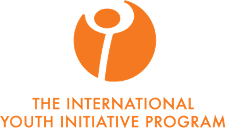Dear friends of YIP,
Here we are, October behind, November knocking on the door. Frosty mornings, misty afternoons, beautiful clear-night skies, the trees getting ready for winter, letting go of their yellow and dark-red leafs – it’s clear that the seasons have shifted.
In this context, the past month here in YIP was spent moving through the last few Global Realities courses, followed by a week of Imagining the Initiative Forum, wrapped up by appreciating all of the members of YIP13. Ready for a well-deserved rest, with our hearts full of gratitude and warmth, we went off into the Autumn break.
Following the natural world around, currently preserving energy and moving inwards as the seasons shift, we too are shifting – from looking outwards and exploring the Global Realities of today, we move into the Inner Awareness block. We are going to be looking in, learning more about ourselves, doing so through movement, painting, sharing our stories and much more.
How is it to do such work living in a community, being constantly surrounded by twenty other human beings that mirror us? How do subtle (or not so subtle) changes and/or shifts in our inner worlds surface in our outer worlds? How do we approach these upcoming weeks? How do we transitioun through them?
I’ll leave you off here, excited and curious, knowing that more questions are bound to come as we step into this next chapter ~ until next time!
Written by Adéla Honigová
In this newsletter you will find:
– Power, Privilege and Oppression by Michael Chiunda
– Economic Systems by David Beeth
– Spriritual Ecology and Resilience Thinking by Wren Welbourne
– Art of Hosting and Harvesting Conversations that Matter by Lilith Wüller
– Imagining the Initiative Forum by Jelmer Verhagen– Food for Thought
~ Little Snippet from Concert Café ~
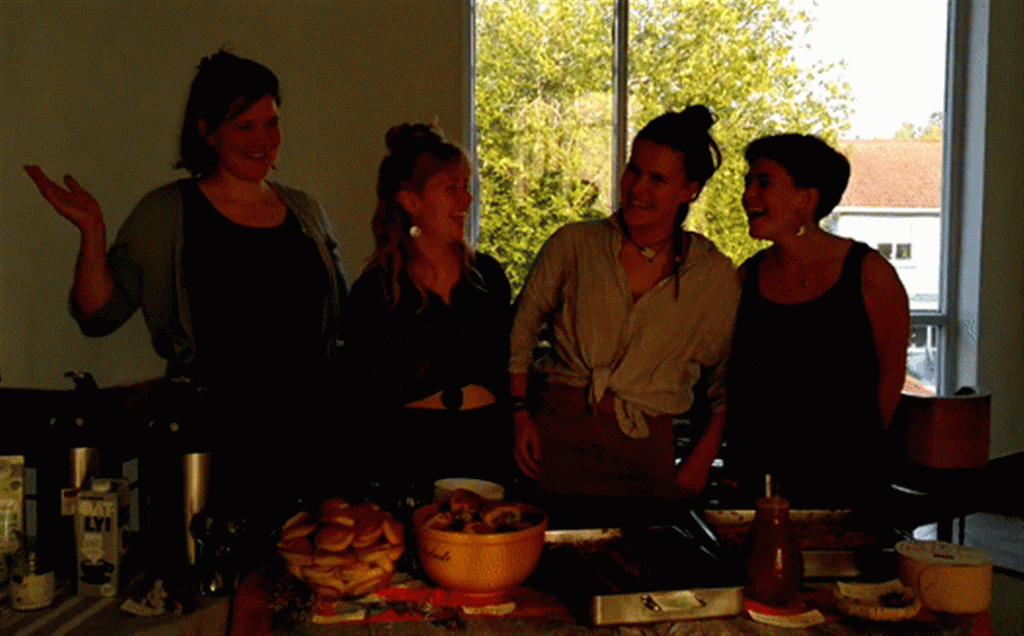
Power, Privilege and Oppression
with Didi Ntsie
I had been anticipating the commencement of this course for the greater part of the Saturday and Sunday before, and when I walked into the Hive, on its first day, I knew I was in for an interesting couple of days.
The room was purposely curated with ‘random’ words on the wall, some of which I had come across. The morning was kickstarted with an introduction with each of the participants’ and contributor’s name and preferred pronoun. In a world that tends to assume the identity of a person based on appearances, this seemingly simple gesture and acknowledgement struck me. It also reminded me of the identities of people that are never addressed or overlooked in a room. In my experience, most of the challenges in communities are in the subtleties, rather than the acute agressions.
After going through the words on the wall and their meanings it was apparent, to me at least, that ignorance is bliss. A continued awakening and consciousness had gripped the group. Later on in that week, I together with the rest of the Yippies would participate in mind boggling yet enriching activities that opened to personal portals with questions such as, “How could I be aware of my personal privilege?” because, believe it or not, everyone has it, or “How could I actively engage with myself so as to notice the voices that need listening to?”
We watched a series of videos that had individuals from different communities share their stories. Before that moment, the course for me had been enlightening, however, I could not help but tear up while I watched these stories. In that moment, I was looking at unique people sharing narratives of how either through arrogance or ignorance society was treating them as a statistic. The resilience in the midst of adversity, the unwavering strength to expose their truths, for me, emitted an unlikely exuberant light.
One of the contributor shared with the group a Ted Talk clip by Chimamanda Ngozi Adichie, a renowned storyteller and feminist. In the clip she explained how we all carry narratives. She further pinpointed on how some minority narratives can be misunderstood, therefore opening a window for a blinkered way of looking at groups of people, races, sexes, genders etc. It reminded me how important it is to continuously write oneself in history. “How does that affect or link with Power, Privilege and Oppression?” the reader may ask. I will pose a question back in response.
When it comes to communities, cultures of nations or people (especially that you have never experienced) if you were to imagine anything about these people, what opinions do you have of them? How did you come across this information? How do you value credibility?
In many places, we depend on the traditional media, i.e. radio, television or other mass media. What we may not realize is that there is a power struggle that is always occurring. How can we therefore, as the human race, continue to grow without forcibly suppressing and oppressing the life around us? This can be in the form of other people or nature or even within ourselves.
The course and the week made me reflect deeply on how to stay aware of the privileges I have.
Written by Michael Chiunda
Economic Systems
with Molly Scott Cato
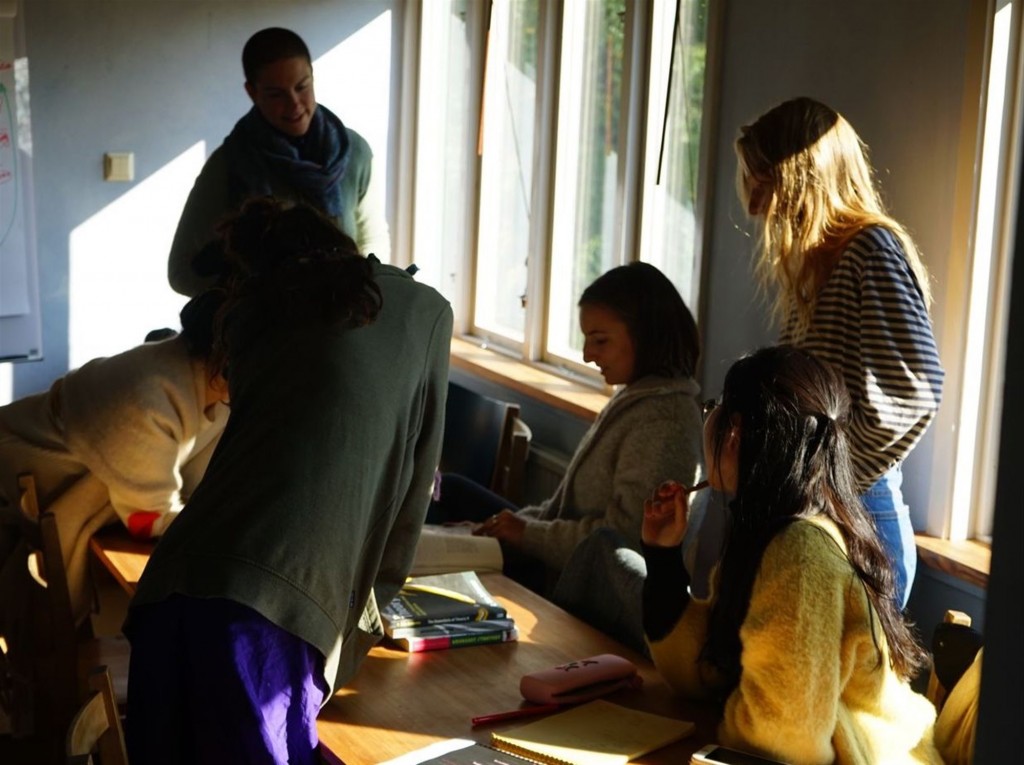
Approaching the end of the Global realities block of the program, we explored Economic systems, with former MEP Molly Scott Cato as our contributor for the week.
Economics is at the heart of today’s world, and how we view economics has a profound effect on our behaviour. A lot of the current economic systems are based on theories and assumptions from the past three centuries, and the truth is that what we now know about the human impact on the planet is not reflected in our economic systems.
Throughout the course so far, I personally had felt that a lot of the courses were creating more questions and problems to solve. During this week though, a lot of viable alternatives and solutions were floated, which gave me hope.
Each day of the week had a topic, and over the course of the week we explored green economics, work & livelihoods, land & food, business & co-operatives and money. We learned the roots of how each of these themes has developed throughout history, which gave us a better idea of why we are in the position that we are currently in. We learned more specifically about alternative policies and practices such as Universal Basic Income (UBI), Carbon Tax, Cap & Share and Personal Carbon Trading (PCT).
As someone that has studied business and economics at university, I was dismayed by the university’s hesitance to address the fact that current business practices and economic systems are essentially encouraging the destruction of the planet and the exploitation of both land and people. Molly however, addressed this head on, in a very matter of fact manner, something I found refreshing.
During the week we did a lot of groupwork. We were tasked with looking at a specific piece of land/community/business and finding a more sustainable and equal way of living. Despite an initial sense of “We are not equipped for this task”, a lot of the ideas and solutions that we did come up with were original, fun and exciting. The tasks really allowed us to look at existing issues and use the tools that we had learned throughout the week in a practical way.
Having spoken with some of my coursemates that had not previously learned about economics, some of them felt that this course helped them understand some of the complexities that we face and allowed them to put together some previously unknown pieces of the puzzle.
I believe this course is very important and I thought that Molly did a fantastic job, sharing a huge amount of knowledge while also giving us time to put our newfound knowledge into practice.
It is so inspiring to know that there are politicians like Molly at the highest level that truly have the best interests of people and the planet at heart, and are fighting to make the world a better place, a place where humans might still have a future.
A huge thank you for this week and for all the work you’ve done over the last decades.
Written by David Beeth
Spiritual Ecology and Resilience Thinking
with Amrita Bhohi and Inte Koster

We spent the week titled ‘Spiritual Ecology and Resilience Thinking’ with two contributors – Inte Koster, who joined us in person, and Amrita Bhohi, who spoke to us over Zoom.
Our week was rich, with many of us feeling that it brought an awareness to the spiritual dimension of our group that hadn’t yet been catalysed .
Our sessions with Amrita began with an inquiry into what our definition was of the word ’sacred’, and how the concept of sacredness informed our being. She brought four core values that would help us build our relationship with the Earth – interconnectedness, reverence, stewardship and service. We spent a lot of time in conversation with eachother and journaling.
In one group conversation, one of my fellow students asked us if we love the Earth. It was easy for us to answer affirmatively – of course we do. She then asked, “and do you think the Earth loves you?”. We sat with this question for a little while, unsure of what the answer was.
Slowly, we came to the realisations that the Earth feeds us, waters us, shelters us, keeps us alive – even as humankind takes more than she has to give. As we rip her forests down, poison her water and air, mine deep into her for fuels, still she gives us what we need to survive. Still, she unfolds in flowers and cleansing rains, pushes through the cracks of cement we have smothered her with, always reaching towards the sky.
We realised together that the earth loves each of us, unconditionally. The earth loves us like a mother loves a child, and we hold a responsibility to do with this gift of love and life all we can to repair our broken bond with the world. To give her the space and nurturing that she needs to heal the wounds she has been given by our species.
The work we did with Inte provided a stage where a deeper, wordless understanding of our relationship with the earth and eachother could emerge – we blindfolded ourselves and tried to find eachother by tuning into our intuition; we walked beside eachother silently in the ancient forests , pondering questions such as “If my life is my gift, how do I want to offer myself?”.
We collected leaves, sticks, moss and stones from the forest and built a temporary altar in the Hive, after a long and extremely wet walk, with all of us bundled in raincoats and wellies. Afterwards we sat in circle, warming our hands on mugs of chai tea and sharing softly spoken words together.
The last session we had with Inte was in the evening, around the fire. We brought offerings to the flames, and as we placed them in, one by one we shared our intentions around how we would offer our lives as a gift. This was the culmination of a recurring thread in our sessions with both Inte and Amrita – the question being “What does it mean to be of service?”.
I spoke to several of my fellow YIPpies who felt that the week had changed the group dynamic in a powerful yet ineffable way. My experience was that the deeper channels of knowing we had acknowledged together had brought us into a different dimension of relationship, allowing a new layer of faith and love to unfold. I felt reminded of my trust in the wisdom of my body, and the deep care the earth has for us.
I finished the week with more energy than I started, feeling rooted and connected to the land surrounding us, and overwhelmed with gratitude for the experience of YIP, the beings around me, and the Earth that holds us throughout our lives.
Written by Wren Welbourne
The Art of Hosting and Harvesting Conversations that Matter
with Maíra Rahme, Helen Titchen Beeth, Kajsa Balkfors and Yannick Wassmer
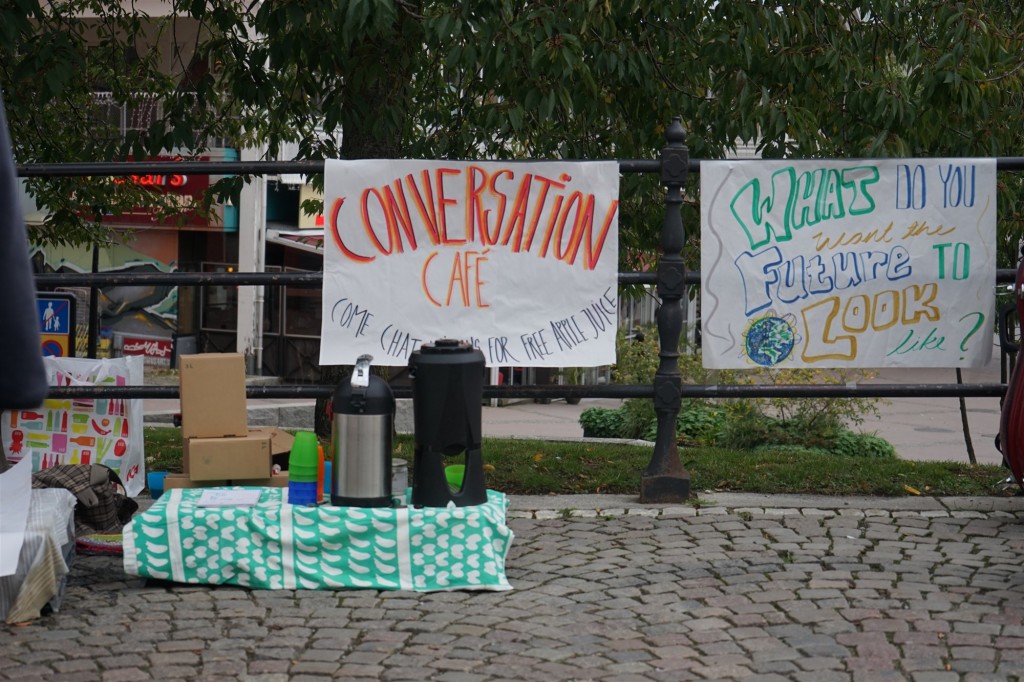
Circles
Circles
People coming together with sparkling eyes and open minds
Ready to create through spoken words, questions and stillness
Where do we find a silence that speaks thousand words?
How can we truly listen with attention
And speak with intention?
What happens when one purpose helps connection, creation and collaboration to
flourish
What do we bring to this process?
How can we hold this space to allow everyone to grow?
How can we make sense in uncertainty?
The past is ready to be answered
The future is waiting for our questions
Emerging from a place of collective intelligence and
wisdom
—
Which direction asks for our energy
And how do we want to move there
…
Humble and curious not-knowing
…
How to find balance between chaos and order
Is that leadership?
What
Essence
Can we distill and move forward with it
?
But what matters to me in this moment is…
How should I explain to you which very important seeds were planted this week and
how practical methods in conversations create
Magic
I will sit with this question while these little insights will hopefully provoke more
questions in us
…
Written by Lilith Wüller
Imigining the Initiative Forum
hosted by YIP13 participants
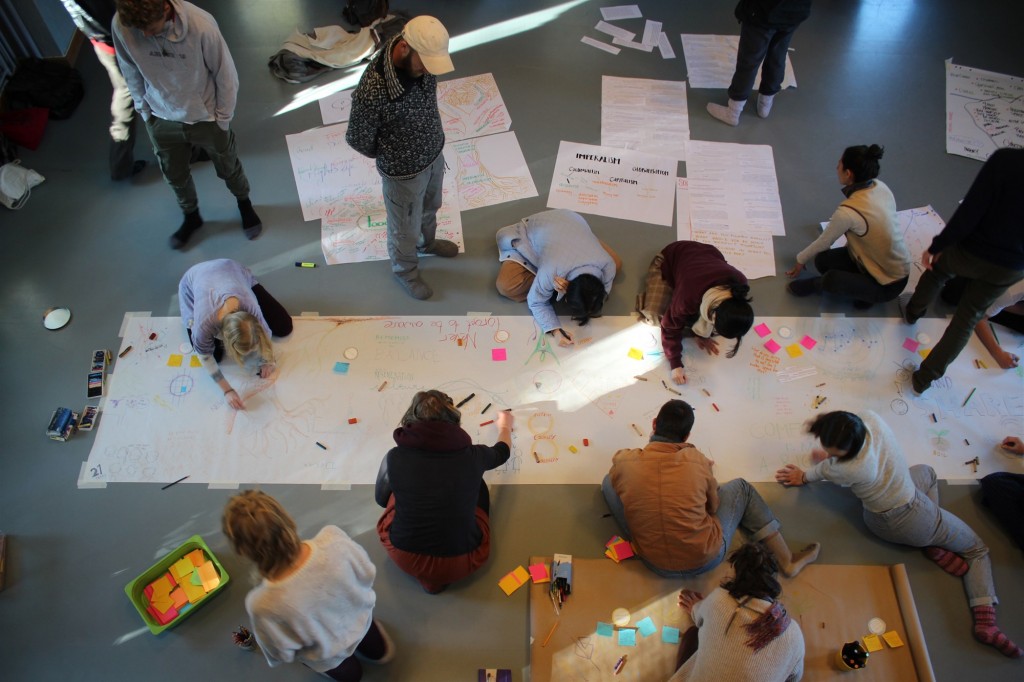
We have been moving from the Global Realities to the Inner Awareness block and this week the change took another step: we had a different rhythm and most of all, this was the first week we didn’t have any contributors.
The first day we looked at all the different courses we have had. What stood up for us and what drives us. The next days we had to organise ourselves.
To do this we used the tools we learned the week before during the Art of Hosting week. For every day we signed up as hosts and for every subject designed a different discussions and brainstorms.
We moved from looking at our own needs to what we need to do to make this happen. We looked at what our limiting beliefs that are holding the process back are and we discussed the theme and principles that will guide the IF. We asked ourselves, “What inspires us that we want to give back to the world?”. It’s wonderful how many contacts we have together in this group, so we put them all down on paper to see who we know collectively that we could invite as a contributors for IF.
A special aspect was looking at our own strengths: what gives us energy, what drives us and what talents can we recognise in each other. It’s amazing to see what others see in you, even the things you might not like in yourself can be a strength through the eyes of someone else.
The afternoon, in which we were discussing the different teams, was quite confronting. It might sound quite straightforward, but with this many people you want to distribute the work evenly with equal opportunities to learn and enjoy.
However, I mainly felt like we were always forgetting an important task, which then came on the last day. We discussed what we want to harvest from the process and event for ourselves, for the participants and for the surrounding community.
The last task was to make a timetable that gives us an overview of what needs to happen when, what our goals are, what the different steps we need to take are and which milestones we want to accomplish at different levels – for ourselves, the teams we are working in and the whole process, from this week until after the IF.
It was a challenging week with lots of different opinions and viewpoints, we only started with the process this week and are far from done. That being said, it’s exciting to work with so many people on the same goal and I am already excited for the Initiative forum.
Written by Jelmer Verhagen
~ Looking forward ~
In the next newsletter you can expect to read more about:
- Transitioning form the Global Realities to the Inner Awareness
- Movement and Initiation
- Portrait Painting
- Biography Work
- Original Instructions

